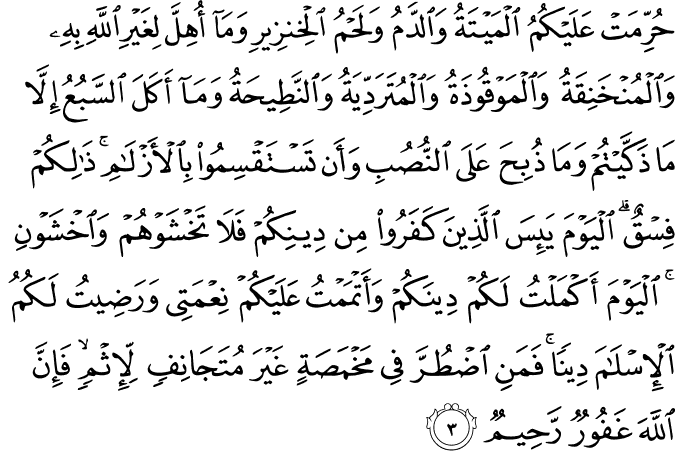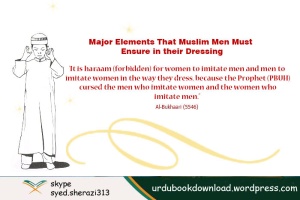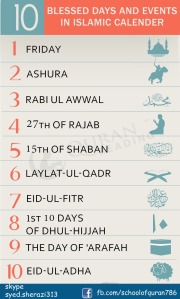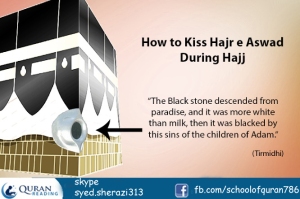Every religion has some specific occasions, which have special value and importance in the lives of its followers, like Christians celebrate Christmas and observe Easter, Hindus rejoice Diwali and Holi. Recognizing and taking part in these events enhance one`s knowledge and implication of its religious ideologies and conviction.
The
Islamic Calendar also contains numerous days of great importance representing the deep lying allusions attached to their occurrences in the earlier history of our religion. Most of these happenings are mentioned in the Holy Quran and Allah SWT Himself has explained their worth.
In this post by
QuranReading.com, we will explore the most significant and blessed Islamic days and instances in the lives of Muslims:
1) Friday
Friday is considered as the most honored and hallowed day of week in the religion of peace. The Holy Prophet (PBUH) has illustrated its worth in the following wording:
“The best day on which the sun rises is Friday. It is the day Adam was created. It is the day when Adam entered the Heavenly Gardens, the day when he was expelled from it and also the day he died. Friday is the day on which the Day of Resurrection will take place.” (Muslim)
All the happenings that are mentioned in this Hadith give the indication of great value of this day. Its significance even increases due to grand congregational prayer held during its daytime, which is called
Salat e Jumu`ah (The Friday Prayers). During this Namaz, the Imam of the masjid (mosque) gives a special address known as the Friday Sermon, which is a great source of getting wisdom and spirituality. Its enormous position in the lives of us Muslims is evident from the fact that the Almighty God has separately mentioned it in the Holy Quran, which contains a separate Surah (chapter) by the name of this day, i.e. Jumu`ah (Friday).

“O you, who have believed, when [the adhan] is called for the prayer on the day of Jumu’ah [Friday], then proceed to the remembrance of Allah and leave trade. That is better for you, if you only knew.” [Quran, 62:9]
It means that it has much wider appeal in a sense that God, the Exalted has directed us to leave every business and move towards answer call to prayer. It is also the same day on which the very first verses of the Sanctified Scripture were revealed to the Messenger (PBUH) of Allah.

“….. This day I have perfected for you your religion and completed My favor upon you and have approved for you Islam as religion….” [Quran, 5: 3]
By reading this Ayah, one can know that Friday is indeed the best day to seek Allah`s mercy and blessings as on this very day, Quran which is the guiding principle for us Muslims, was first disclosed on the Holy Prophet (PBUH). Also, one can recite certain Quranic chapters like
Surah Kahf on this day to be able to get the Almighty`s protection and blessings.
2) Ashura
Observed on 10
th of
Moharram (first Islamic Year), this day has two major implications. First, it serves as a means of remembrance of migration of Hazrat Musa/Moses (A.S) from Egypt to save His followers from the tyranny and oppression of Firaon (Pharaoh). We Muslims fulfill the sunnah of Musa (A.S) Who fasted on this day to thanks Allah SWT for saving them on this day.
Abu Hurrerah (R.A) reported:
“I asked the Prophet: ‘Which Prayer is the best after the obligatory Prayers?’ He said: ‘Prayer during the mid of the night.’ I asked: ‘Which fasting is the best after that of Ramadan?’ He said, ‘the month of Allah that you call Muharram’” (Ahmad, Muslim, and Abu Dawwud).
It means that fasting on this day is closer to doing so in the Holy month of Ramadan. Second great factor that is associated with this day is that it refers to the heartrending death of the Prophet’s grandson,
Hussain (R.A) at the hands of the Umayyad ruler, Yazid. It reminds us of the great significance of the action of standing firm one the word of righteousness against the tyrant and non-believing rulers.
3) Rabi ul Awwal (Prophet`s PBUH Birth)
This is the month in which Muslims received the greatest blessing from Allah SWT, as the last Prophet, Hazrat Muhammad (PBUH) was born in it, though there is no general
consensus among the Muslim sects related to the exact date of His birth. The fact remains that this wonderful month has that special day, which proved to be the stepping stone in revolutionizing the lives of millions of people. Muslims all over the world commemorate during this blessed month and take the opportunity to show their love and gratitude towards the Holy Prophet (PBUH).
4) 27th of Rajab
One of four sacred months of Islamic Calendar (rest of three are
Zul Qa`dah, Zul Hajj and Muharram), it has general meaning of ‘to respect” and is regarded as the Month of Allah by the Holy Prophet (PBUH). Generally, it is associated with fasting for the sake of the Most Merciful. Rasulullah (PBUH) was quoted by Abu Hurrehah (R.A) as fasting throughout this month, besides Ramadan. Specifically, it contains a sacred night, i.e. 27
th of Rajab, on which the Messenger (PBUH)of God was taken by Jibrael (A.S), the Angel of Allah, first on “Isra” (journey) from Makkah to Jerusalem where He (PBUH) lead the prayers with all the previous Prophets behind Him. Then, He went on
“Mer`aj” (elevator) from Jerusalem to the heavens, till He got the honor of meeting with Allah SWT. From there, Muslims were directed to
offer Salah daily which is the most useful way to get closer to the Almighty, and results in His forgiveness.
5) 15th of Shaban
Commonly known as the month of Prophet Muhammad (PBUH), it contains a night, i.e.
15th of Shaban, in which Muslims throughout the world ask for Allah`s clemency and His blessings by spending the whole night in His worship and reciting the Holy Quran. Although the topic of celebrating on this particular nighttime is a disputed one among the Muslim sects, but still it has the greater implication in terms of getting the Almighty`s mercy.
“In the fifteenth night of Shaban, Allah manifests and forgives all His creation except for the Mushrik (idolater) and the spiteful.” (Ibn Majah)
So, it means that the true believers of the religion of peace, when they expend the entire night in Allah`s remembrance and His pardon, the Almighty Lord responds to their plea and comfort their hearts and souls by forgiving their past sins.
6) Laylat-ul-Qadr
The Holy month of Ramadan, which on one hand, provides us Muslims with the opportunity to fast for the sake of Allah Almighty, and earns us His compassion and good tidings. On the other hand, it also consists of an extraordinary and highly rewarding night which involves constant memory of the Creator of the universe through prayers and Quran reading. The great worth of this very time of the dark is discussed in the Holy Quran, where there is a separate Surah (chapter), named as Surat-ul-Qadr describing it like:
“Indeed, We sent the Qur’an down during the Night of Decree. And what can make you know what is the Night of Decree? The Night of Decree is better than a thousand months. The angels and the Spirit descend therein by permission of their Lord for every matter. Peace it is until the emergence of dawn.” [Quran, 97: 1-5]
So, it is the night in which Furqan e Hameed was revealed on the Prophet (PBUH) for the first time, which is a great guiding source for Muslims in every walk of life. This
single night is regarded as better than thousand months, which shows the great returns from the Almighty as a result of praying in it. Hazrat Aisha (R.A) stated that the Holy Prophet (PBUH) said,
“Look for Lailat-Ul-Qadr in the odd nights of the last ten days of Ramadan.” (Bukhari)
It shows that there is no defined night for acquiring the blessings of the Most Gracious; instead one has to keep searching for it during the odd nights of the last part of Ramadan. Majority of Muslims all over the world fulfill Sunnat I`tikaf, spend their time in the mosque to worship and recite the Sacred Scripture, till they acquire the blissful night of Qadr (the Nighty of Power/destiny/value).
7) Eid-ul-Fitr (Festival Followin Fasting During Ramadan)
After fasting for whole month of Ramadan,
Muslims are blessed by the Almighty Lord with a celebration named Eid-ul-Fitr. A special prayer is offered in the mosque having similar sermon like that of found in the Salah of Jumu`ah, but is done after Fardh (obligatory) Rakats. It not only serves a festival to enjoy the blessings of Allah for three consecutive days but also a great source of meeting other family members, sharing happiness, inviting guests, giving charity, which in turn make us able to receive many of the bounties of the Most Beneficent.
8) The First Ten Days of Dhul-Hijjah
The 12
th and final month of the Islamic Calendar, called
Dhul-Hijjah, is one of the most sacred months. Its literal meaning is
“Possessor of the Pilgrimage”, which is because Hajj (grand pilgrimage) is performed by the Muslims on the 8
th, 9
th and 10
th of this month. Its first ten days are highly revered and blissful. Ibn Abbas (R.A) narrated the Holy Prophet (PBUH) saying as:
“No good deeds done on other days are superior to those done on these (first ten days of Dhul Hijja).” Then some companions of the Prophet said, “Not even Jihad?” He replied, “Not even Jihad, except that of a man who does it by putting himself and his property in danger (for Allah’s sake) and does not return with any of those things.” (Bukhari)
The above mentioned Hadith shows that committing righteous actions during these
first days have even more influence than other good deeds, even Jihad, which is itself one of the greatest things to do for Allah. The Messenger (PBUH) of the Almighty also used to fast during these days. One of the wivesof Muhammad (PBUH) said:
“Allah’s Messenger used to fast the [first] nine days of Dhul-Hijjah, the day of ‘Ashurah, and three days of each month.” (Abu Dawud)
So, the first days of this month are highly sanctified and venerated that they serve as means of awarding us with great rewards of Allah SWT.
9) The Day of ‘Arafah
On 9
th day of Dhul-Hijjah, the pilgrims gather around in the ground of Arafah for praying and seeking Allah`s mercy. Those who are not able to
perform Hajj are advised to keep fasting on this day; however it is not necessary for the pilgrims to fast on this day because of their tough circumstances. Abu Qatadah (R.A) reported that the Messenger (PBUH) said:
“Fasting the Day of ‘Arafah expiates the sins of two years: past one and coming one. And fasting on the Day of ‘Aashuraa’ expiates the sins of the past year.” (Muslim)
This Hadith describes the spirit of fasting on this day for sake of the Almighty in terms of being forgiven the sins of previous and coming year. Aaishah (R.A) reported that the Messenger (PBUH) said:
“There is no day on which Allah frees people from the fire as He does on the Day of ‘Arafah. He comes close and then He boasts to His angels: ‘What are these people seeking?’” (Muslim)
It means that Allah SWT highly admires its servants who bow in front of Him, and seek His pardon, and He shows His gladness with His Angels about his fact as narrated in the above mentioned saying of the Holy Prophet (PBUH).
10) The Ruling Of The Udhiyah (Sacrifice)
The word udhiyah means an animal from class of “an`aam” (camel, sheep, cow, goat). Muslims who have the capacity to have or buy such animals are ordered by the Almighty Lord to sacrifice animal in His way, and get His rewards. It has great importance as it opens the gates of blessings and mercy of the Gracious God, and results in easiness of matters as Hazrat Musa (Moses) (A.S), as directed by the Allah to slaughter a cow to be able to solve the mysterious murder. The Holy Quran repeatedly mentions about sacrificing in the way of God:

Say, “Indeed, my prayer, my rites of sacrifice, my living and my dying are for Allah, Lord of the worlds.” [Quran, 6: 162]
This Ayah shows that sacrifice is done for sake of Allah SWT, as it is mentioned along with prayer. Anas (R.A) reported that the Messenger (PBUH) said:
“He who slaughtered before the prayer (of Eid) has only slaughtered for himself. But the one who did it after the prayer has indeed completed his sacrifice and conformed with the Sunnah of the Muslims.” (Bukhari)
The above stated Hadith tells about the right time of slaughtering the animal, i.e. doing it after the prayer of
Eid-ul-Adha, which is obligatory to perform. The greater implication of this day is to keep the poor in mind, being aware of their poor condition, give them charity and divide the flesh of animal among them and be grateful to Allah for all His blessings.
These are 10 and the most important days and events that are found in the Islamic Calendar, which, unlike other religions, are not only meant for making merry or worshiping alone, but they are a complete package for keeping a balance between our worldly and eternal life by reviving the true essence of Islamic convictions.







